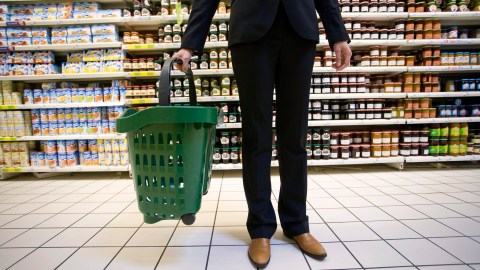France Tackles Food Waste Epidemic with Groundbreaking Supermarket Commitments

The World Bank estimates that around 1.3 billion tons of food is wasted around the globe. That’s close to one-third of all food produced. France is taking direct action to help bring those numbers down. The European country passed a law earlier this year that would have required supermarkets over 4,305 sq. ft. in size to donate unsold food to charity, give it away as animal feed, or face fines of up to $82,000 and two years in jail.
The ruling came in direct response to reports of supermarkets dousing bleach on unsold foods to prevent food foragers from retrieving any edible food from the trash heaps dumped by chains around the country. The effort was the largest attempt yet to use government regulation to curb the global issue of food waste.
[R]educing food waste by 50 percent at a global scale could feed up to 1 billion people. This is why France is looking to create education programs to accompany its supermarket ruling, understanding that a change in outlook needs to accompany any government regulatory programs.
The law raised just as many problems as it did solutions. In France, for example, more than 67 percent of the 7.1 million tons of food wasted is actually thrown out by consumers. Here in the United States, the numbers are just as damning. While in 1980 food waste accounted for less than 10 percent of total waste, it now makes up to a fifth of the country’s garbage. That translates to $640 worth of food a year, per household. These numbers point to the larger issue of food waste, one which might not be so easily solved with fines on supermarkets. It was with that in mind that the proposed law was struck in mid-August, forcing France’s Minister for Ecology, Ségolène Royale, to obtain instead a series of voluntary agreements with the targeted supermarkets where they pledged to curb their food waste.
But if the food waste epidemic is to be tackled head on, it’ll have to be at the consumer end. Part of this will depend on changing the conversation of food waste from mere guilt to understanding its financial and environmental impact. According to a 2012 study, reducing food waste by 50 percent at a global scale could feed up to 1 billion people. This is why France is looking to create education programs to accompany its supermarket ruling, understanding that a change in outlook needs to accompany any government regulatory programs.
Demographer Joel Cohen explains just how dire the global food crisis is and, given the amount of excess food produced by some countries, it is absolutely insane that others are full of starving people.
This post has been updated with the information of the law being stricken and the agreements signed by minister Ségolène Royale.
—
Manuel is a NYC-based writer interested in all things media and pop culture. He’s a regular contributor to The Film Experience and Remezcla. His work has been featured in Mic News, Film Comment, and Model View Culture. He also has a PhD, but hates bragging about it. www.mbetancourt.com





